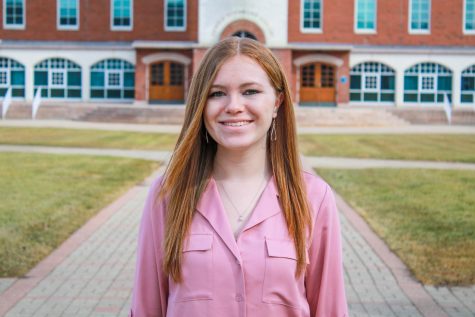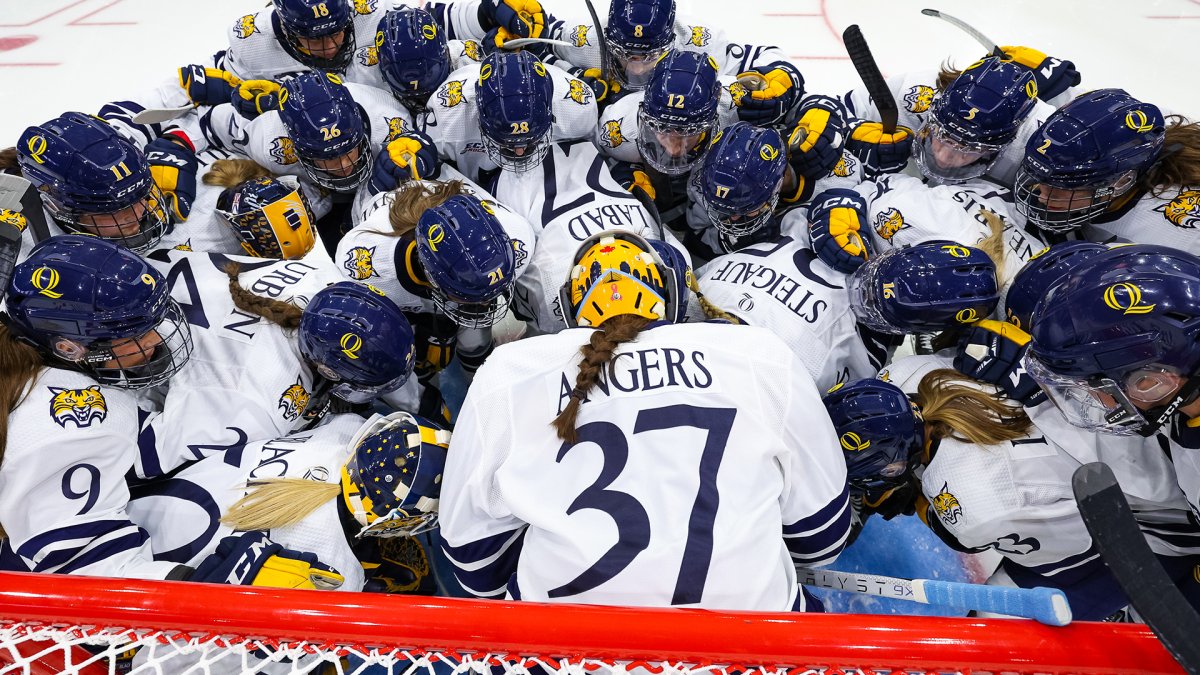SGA disappointed in attendance at student town hall event
December 4, 2019
Quinnipiac University President Judy Olian held a town hall event for students to ask questions and share their concerns on Tuesday in the Mount Carmel Auditorium.
“This town hall, like the other town halls that we’re doing, should all produce a list of issues, action plans that we have in mind and responsible parties,” said Interim Provost and Executive Vice President Jennifer Brown.
The event started at 3 p.m; however, very few students were in attendance. They started at approximately 3:05 p.m., but not many more showed up.
“There’s a lot on people’s plates right now, so certainly I would understand why it might be hard for students to come to something like this,” Brown said. “I wouldn’t necessarily assume that it’s because students don’t care. I wouldn’t assume it means that students are all perfectly happy. I’m sure that there are plenty of issues that we need to continue to address.”
Student Government Association (SGA) Vice President for Student Experience Esau Greene worked with public affairs to organize this town hall for the past few months. Greene was happy with how the event went, but he was disappointed in the number of students that attended.
“It was a little disheartening,” Greene said. “I think that being especially the vice president for student experience on Student Government, I’m always looking to see students get more involved, use their voice.”
Several members of the administration, including Brown, Vice President and Dean of Students Monique Drucker, Vice President for Facilities and Capital Planning Sal Filardi and Vice President for Equity Inclusion and Chief Diversity Officer Don Sawyer, joined Olian to assist with answering questions. Deans from some of the schools as well as other faculty and staff members were also there to answer questions.
While there weren’t that many students at the town hall, students that could not make the event could still ask questions. The website application, slido, was used for students who were not able to attend to send in questions. Chief of Staff Bethany Zemba read these questions for the administrators to answer.
SGA President Austin Calvo asked the first question. He said that when he was campaigning for president, he learned that students wanted to know what changes are being made at Quinnipiac that will impact them now. Calvo said that he is in support of the strategic plan but noted that it is a five-year plan, so most current students will not be at Quinnipiac by the time it is completed.
Olian, Drucker and Filardi answered this question. They explained a variety of changes, including new labs on the North Haven campus, the addition of club sports, free laundry beginning next fall, renovations to three residence halls and a pub in the Rocky Top Student Center.
“We have had a lot of opportunities to have a voice and student voices in part of all these processes from the Facilities Master Plan to really down to the granular with the residence halls and the pub,” Drucker said. “I’m very excited about that as the dean of students to know that we’ve had students a part of that to have their voices heard.”
A first-year student asked about the wait times at the health and wellness center on the Mount Carmel campus.
Drucker acknowledged that “we are full.” She said that many students utilize the resources that the health and wellness center offers and appointments can be made ahead of time online.
“We are working steadily to increase those services, but there’s also some space concerns,” Drucker said. “We don’t even have other opportunities in that building for additional exam rooms.”
Drucker mentioned that the administration is looking at remodeling a bigger health and wellness center.
Junior and Executive Chair for the Multicultural Student Leadership Council Andrew DePass brought up issues regarding race and inclusion campus.
“These are problems that I experienced personally in the classroom, as well as similar problems that I have heard from every other student of color on campus.” DePass said.
Olian said the administration is working on the importance of inclusiveness. Some things that have already been done are hiring more faculty of color, the partnership with local community colleges and the New Haven Promise scholarship.
“We’re not going to solve the bigger issues of our society, let alone of our community if we are just silent,” Olian said.
Sawyer thinks that the university will always have race issues, but he believes these issues will be addressed appropriately.
“We have to define the terms that we’re using,” Sawyer said. “We have a definition for inclusive excellence. But, when we talk about equity, when we talk about inclusion, when we talk about diversity, what do we actually mean?’
DePass also brought up a topic that the administrators seemed surprised about. He discussed how important the music program at the university is to some students and that there needs to be more resources allocated for them.
Brown loved the idea and offered the idea of getting more instruments for the music program.
“I think it’s kind of an interesting and exciting though that we might do more to foster music on this campus,” Brown said.
A question that was sent in asked how the budget is directly impacting students, despite students being told that it does not affect them.
“When we realized we were going to have less revenue, less money to spend, people needed to think about their priorities,” Brown said. “That was not a decision that was made by any one person or some central group deciding.”
Brown said that the students are the top priority. Programs were cut based on feedback from faculty and staff.
The deans of each school and vice presidents were given the opportunity to choose what is most important to spend money on.
“This year, it was clearly a more collaborative approach, and we wanted to reach out to all the deans and all the vice presidents and let them figure how out how to best make the adjustments that they needed to make,” Vice President for Finance and Chief Financial Officer Mark Varholak said. “We’ve tried to be as flexible as possible to make sure that those things that touch and impact the students’ lives, their academics, the student experience, that they were not impacted negatively.”
Brown said that the administration plans to work on addressing the issues that were brought to its attention.
Despite the issues brought up at the town hall, Calvo believes fixing these problems begins with students showing up to events like this.
“I wish more students would have shown up,” Calvo said. “Students like to complain about things a lot… but won’t actually go to the proper avenues to have their complaints addressed. I think with something like this, there was an email sent out to the entire student body three separate times over the past month, for no one to show up is a little bit disheartening.”








